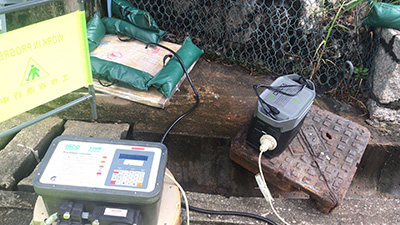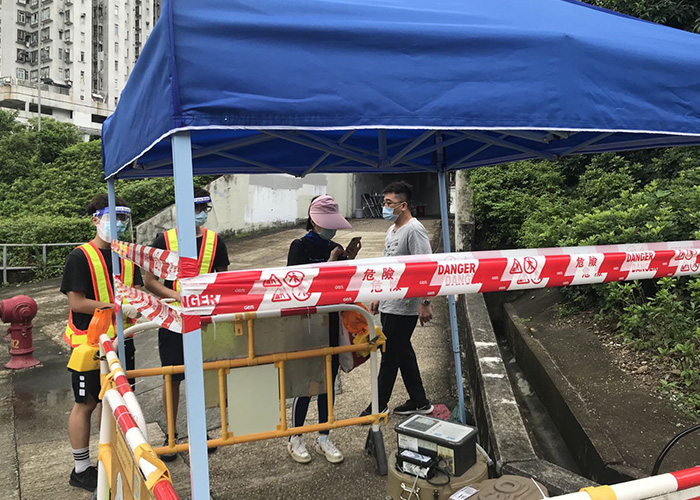
The 12th Lumb Lecture: Risk Assessment and Management: Necessary Insight to Reduce Landslide Risk
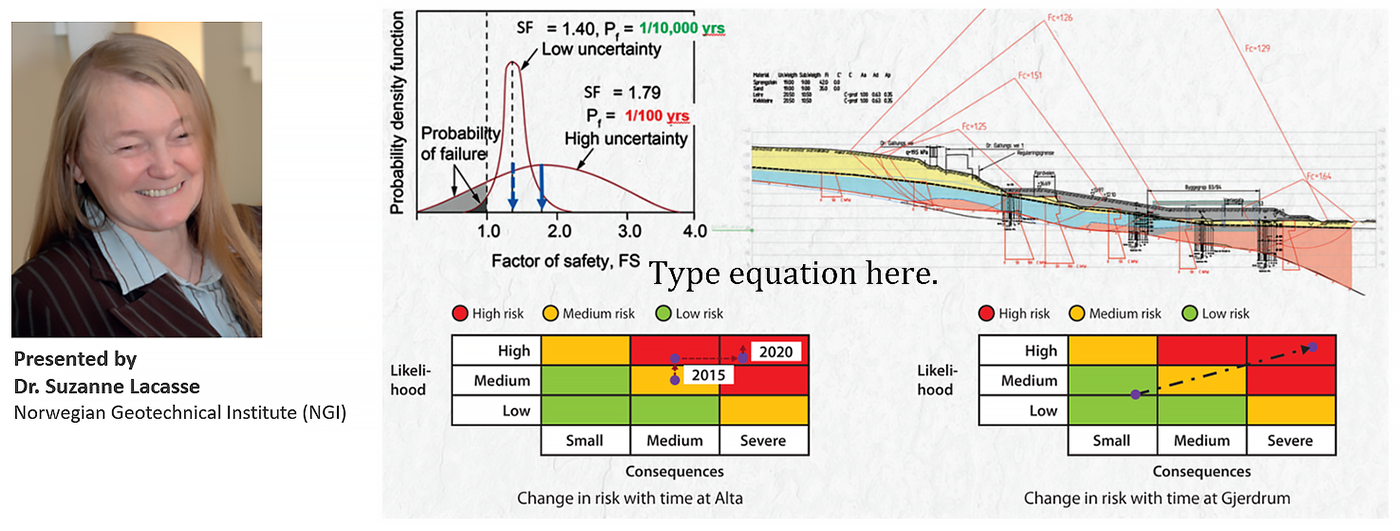
The 12th Lumb Lecture entitled "Risk assessment and management: Necessary insight to reduce landslide risk" will be delivered by Dr. Suzanne Lacasse, Expert Adviser, Natural Hazards, Norwegian Geotechnical Institute. The Lecture will be held at 6:30 p.m. on June 27, 2023 (Tuesday) in the Rayson Huang Theatre of The University of Hong Kong.
Click here for more information of the lecture

The 11th Lumb Lecture: Bridging the Gap between Theoretical and Actual Slope Performance
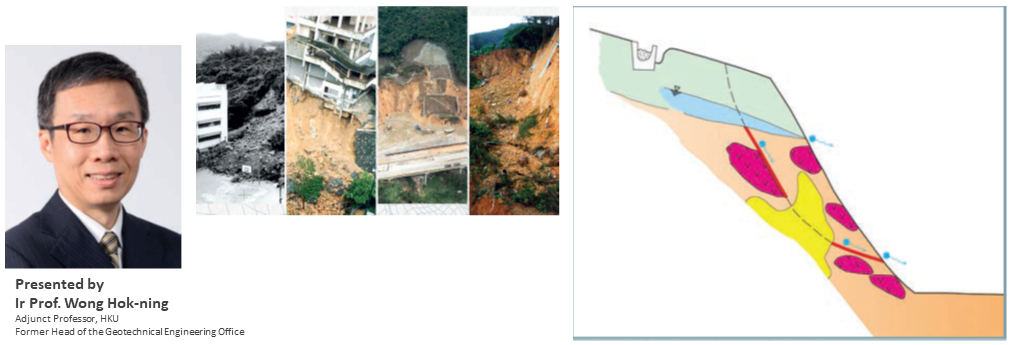
The Eleventh Lumb Lecture entitled "Bridging the Gap between Theoretical and Actual Slope Performance" will be delivered by Ir Professor Wong Hok-ning, Adjunct Professor of Department of Civil Engineering, The University of Hong Kong and Former Head of the Geotechnical Engineering Office. The Lecture will be held at 6:30 p.m. on December 3, 2021 (Friday) in the Rayson Huang Theatre of The University of Hong Kong.
Click here for more information of the lecture

HKU Civil Engineering team uncovers the role of prokaryotic viruses in wastewater treatment plants

Shared viral genera in six WWTPs in Hong Kong.
A research team led by Professor Tong Zhang in the Department of Civil Engineering at the University of Hong Kong (HKU), published a paper on the leading multidisciplinary science journal Nature Communications. They applied a systematic metagenomic pipeline and retrieved a catalogue of around 50,000 prokaryotic viruses (phages) from six wastewater treatment plants (WWTPs) in Hong Kong, revealing the large and uncharacterized viral diversity in activated sludge (AS) which is the most widely used biological treatment process. The findings largely expand the current AS prokaryotic virus catalogue and provide reference for the phage treatment to control undesired microorganisms in WWTPs.
By acting as major bacterial predators, phages could regulate the composition of microbial community and impact the removal efficiency of pollutants through virus-host interactions with key bacterial populations in AS systems.
Professor Zhang said: “Prokaryotic viruses are so small that people often overlook the role of them in WWTPs. By uncovering the extensive virus-host interactions in functional microorganisms in WWTPs, this study highlights the potential role of phages in pollutant removal and environmental protection.”
This work is a part of Professor Zhang’s project supported by the University Grants Committee’s Theme-based Research Scheme (TRS) aimed at supporting research of strategic importance.
The first author, Dr. Yiqiang Chen, is a PhD graduate of Professor Zhang. Other scientists contributing to the research include Dr. Yulin Wang, who is a postdoc in Professor Zhang’s research group, Dr. David Paez-Espino (Joint Genome Institute of Department of Energy of USA), and Professor Martin F. Polz (University of Vienna & Massachusetts Institute of Technology).
The research paper “Prokaryotic viruses impact functional microorganisms in nutrient removal and carbon cycle in wastewater treatment plants” has been published in Nature Communications: https://doi.org/10.1038/s41467-021-25678-1

Ms Lu Peng Won the Virtual HKU Three-Minute Thesis Competition 2021
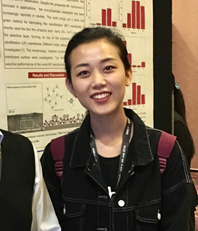
Ms Lu PENG
PhD candidate in the Faculty of Engineering
YouTube video (click title below):
A Bubble within a Membrane, a Drop from the Ocean
Primary Supervisor:
Professor Chuyang TANG
Our PhD student Ms Lu PENG has won the Virtual HKU Three Minute Thesis (3MT) Competition 2021, which was held from April to June 2021. 188 PhD, MPhil and PD students participated in the competition by submitting their presentation videos.
The competition was keen and the students showed great enthusiasm when presenting their research in succinct and easily comprehensible language. The champion, 1st runner-up and 2nd runner-up were selected by the judging panel, while the winner of the Online People’s Choice Award was selected based on a novel approach – the candidate who received the most ‘Like’ votes on YouTube by the date of 7 June 2021 would be given the award.
“The Three Minute Thesis (3MT) Competition gave me a good opportunity to share my research with a general audience”, Ms Peng remarked, “Membrane-based desalination and water reuse have been playing a crucial role in addressing the worldwide scarcity of freshwater. I am grateful to be one of the researchers who are pursuing potential break through on the efficiency of membrane-based water purification. I would like to express my gratitude to my supervisor, Prof. C. Y. Tang. His guidance, support and encouragement made my research journey possible and enjoyable. I also appreciate the helps and love from my lab mates. It is my great fortune to be one of the group members in membEST.”

Modular Integrated Construction (MiC) Booklets Launch at HKU
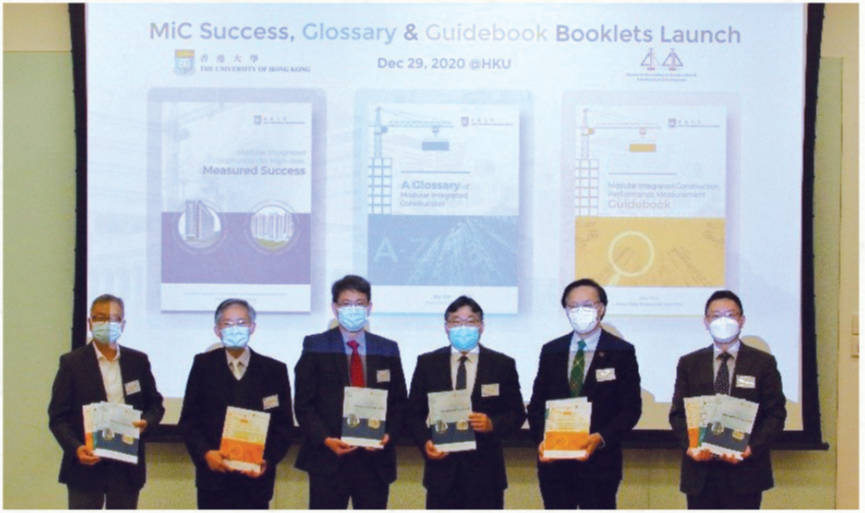
The Centre for Innovation in Construction and Infrastructure Development (CICID) of Department of Civil Engineering of HKU produced three Modular Integrated Construction (MiC) booklets which were launched at HKU on December 29, 2020. The three booklets are entitled “Modular Integrated Construction for High-rises: Measured Success”, “A Glossary of Modular Integrated Construction”, and “Modular Integrated Construction Performance Measurement Guidebook”.
Officiating at the launching ceremony, Ir Lam Sai-hung, JP, Permanent Secretary for Development (Works) again pointed out Government’s policy to support MiC. He said, “Hong Kong’s construction industry is facing severe challenges due to declining productivity and ageing workforce. Projects adopting MiC show definite benefits over conventional construction methods. Through the concerted effort of the Government, industry and academia, MiC will contribute to modernizing Hong Kong’s construction industry.”
“We are more than delighted to launch the three MiC booklets. These publications not only contribute clarity and new understanding of MiC in Hong Kong, but also provide useful guidance for the industry and enterprises to adopt and measure the new technology,” Professor Christopher Chao, Dean of Faculty of Engineering of HKU said at the ceremony.
Ir Professor W. Pan, Executive Director of HKU CICID and lead author of the three publications said “The aim of the MiC booklets is to support Government’s policy on MiC and to bring clarity and understanding of the new technology to Hong Kong’s construction industry. They will provide comprehensive benchmarking of social, environmental and economic performance of adopting MiC to high-rise building projects in Hong Kong.”

Digital twinning of rock fracturing
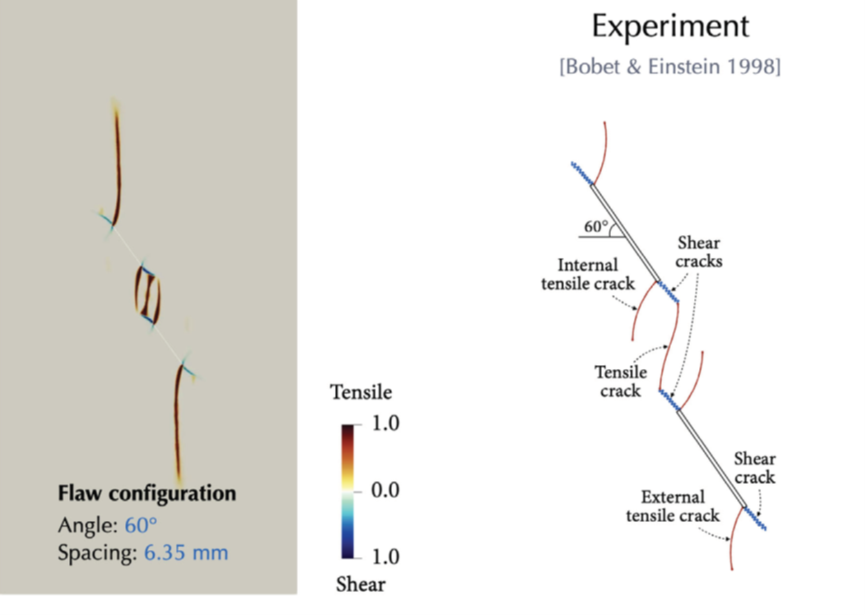
Simulation of mixed-mode fracturing in rocks remains one of the most challenging problems in computational mechanics, despite its critical importance for many problems related to infrastructure resilience, energy resources, and environmental sustainability. Recently, HKU researchers have developed a new approach – called the double-phase-field method – which can accurately simulate and distinguish between tensile and shear fractures without any algorithm for tracking crack geometry. (See the full video from https://youtu.be/zQRoCSFssVw)

Professor W. Pan awarded 2020 Honours List and Chief Executive's Commendation for Community Service
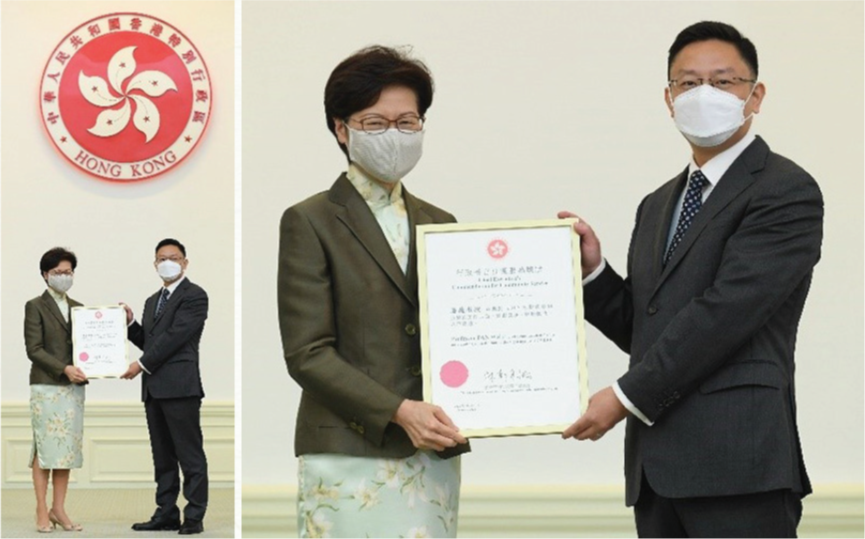

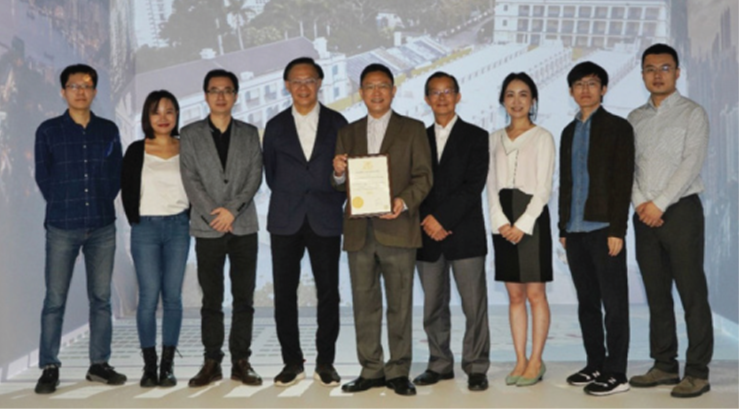
Professor W. Pan was honoured in the 2020 Honours List of the HKSAR Government, and received the Chief Executive’s Commendation for Community Service for his outstanding contribution in the fight against COVID-19, at the 2020 Honours and Awards Presentation Ceremony held at the Government House on November 15, 2020.
In response to the outbreak of COVID-19 and the fast development of this pandemic, the HKSAR Government decided in late January 2020 to build new quarantine camps to meet the extremely urgent need for quarantine. The first such project delivred in Hong Kong is the Lei Yue Mun Quarantine Camp (LYMQC).
The target for the Architectural Services Department (ArchSD) of the HKSAR Government, the project client was to deliver the Camp with high quality and speed. The ArchSD, together with the main contractor China State Construction (Hong Kong) Limited and in collaboration with the Centre for Innovation in Construction and Infrastructure Development (CICID) of Department of Civil Engineering at The University of Hong Kong (HKU), completed the quarantine camp in two stages – the first batch of 118 units in 25 days and the remaining 234 units in 60 days.
HKU CICID as Academic Collaborator of the project team set up a cloud-based web portal for real-time logistics monitoring of module transportation and installation. CICID also developed an AI-based and computer vision which enabled module detection algorithm for module lifting cycle time estimation and module installation progress prediction. This technique employed an unmanned aerial vehicle for taking aerial photos for site progress and safety monitoring.
Professor W. Pan commented, “The use of MiC technology in this quarantine project provided an exemplar to showcase the fast and quality project delivery which encompassed project planning, design, module production and installation. This project will serve to demonstrate the feasibility of a new mode of project delivery using smart construction technologies.”

Dr. R.H. Li and Professor X.Y. Li were awarded the HKIE Best Transactions Paper Prize 2020
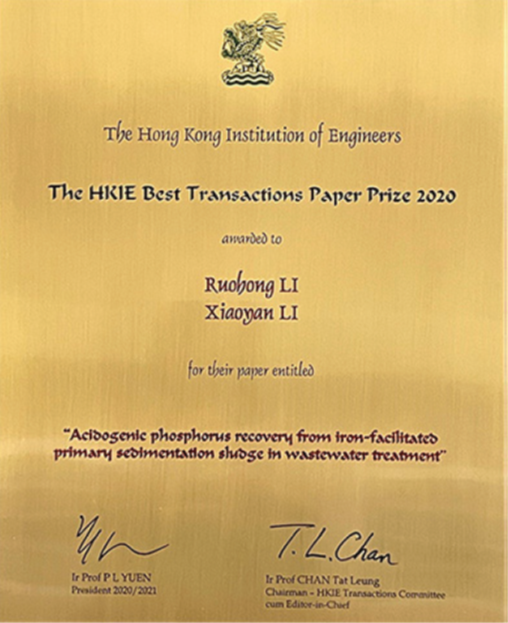
Dr. R.H. Li and Professor X.Y. Li were awarded the HKIE Best Transactions Paper Prize 2020 for their paper published in HKIE Transactions Volumn 26 No. 2 titled “Acidogenic phosphorus recovery from iron-facilitated primary sedimentation sludge in wastewater treatment”. Dr. R.H. Li is a Ph.D. graduate from the Department and Professor X.Y. Li is his supervisor. Their paper was published in the Theme Issue of HKIE Transactions on Sustainable Wastewater Technologies for Pollution Control and Resource Recovery in 2019. The paper presented their experimental study on the integration of the chemical phosphorous removal (CPR) process and acidogenic phosphorous recovery (APR) for enhanced phosphorous (P) removal and recovery in wastewater treatment. The CPR-APR system utilises iron-based CPR to achieve a high P removal and then acidogenic fermentation to extract P from the Fe-sludge for P recovery as a valuable fertiliser resource. The new technology has advantages such as high recovery efficiency, easy operation and little secondary pollution for effective P recovery from wastewater and sludge. The prizes include a cash award and 2 wooden plaques.

Professor C.Y. Tang received the 2020-2021 RGC Senior Research Fellow Award, the inaugural HKU Innovator Award, and the VEBLEO Fellow Award

Professor C.Y. Tang received the 2020-2021 RGC Senior Research Fellow Award. He is among the ten awardees in this inaugural round of the prestigious fellowship. The RGC Senior Research Fellow Scheme (SRFS) provides sustained support and relief from teaching and administrative duties to exceptionally outstanding researchers at UGC-funded universities in Hong Kong, with a view to facilitating their full dedication to research and development and helping universities attract and retain research talent. Under the fellowship, Professor Tang receives a grant of HK$7.8 million to conduct cutting-edge research in membrane technology. Professor Tang is recognized as a world leader in membrane technology, desalination, and water reuse. He has made critical contributions to the better understanding of the nanoscale structures of desalination membranes and their transport behaviors. He is the lead inventor of aquaporin-based biomimetic membranes. For the first time, he demonstrated a scalable biomimetic desalination membrane that incorporates aquaporins (water channel proteins) for highly efficient water transport while maintaining excellent selectivity. This new-generation membrane technology, widely recognized in the desalination field, that has been commercialized in Singapore, Denmark, and China. Professor Tang developed the pioneer work on interfacial nanofoaming for controlling the surface roughness and morphology of polyamide reverse osmosis membranes. For the first time, he elucidated the fundamental mechanism of interfacial degassing that shapes the surface roughness features, thus solving the 40-year puzzle for membrane researchers. His nanofoaming method is highly effective to overcome the longstanding permeability-selectivity tradeoff of reverse osmosis and nanofiltration membranes. His work on designing membranes to directly target micropollutant removal bridges a critical literature gap between membrane synthesis and water reuse applications and has been featured in Chemical Engineering News as an agenda-setting work for the future development of membranes for water reuse.
Professor C.Y. Tang received the inaugural HKU Innovator Award in recognition of his distinguished achievements in the development of novel filters and membranes. The new HKU Innovator Award has been established to recognize “outstanding Faculty members whose innovations demonstrate exceptionally high potential impact (legacy or projected legacy) with transformative results to foster development”. The novel water filters and air filters developed by Professor Tang’s team has been recognized by numerous awards in recent years. The rapid water filter technology receives a Gold Medal at the 47th International Exhibition of Inventions Geneva (2019), the MIT Technology Review’s Innovators Under 35 Asia Pacific (2019), and the HKIE Outstanding Paper Award for Young Engineers/Researchers (2020). The reusable air filter technology receives a Gold Award, the Top 20 Best Invention Award, and the Special Award by Toronto International Society of Innovation & Advanced Skills at the 5th International Invention Innovation Competition in Canada (2020).
Professor C.Y. Tang received the VEBLEO Fellow Award in honour of his career achievement in membrane technology. The award recognizes researcher “who has prominence and leadership in the field of science, engineering, and technology”.

Mingde Project Team won the Faculty Outstanding Teaching Team Award
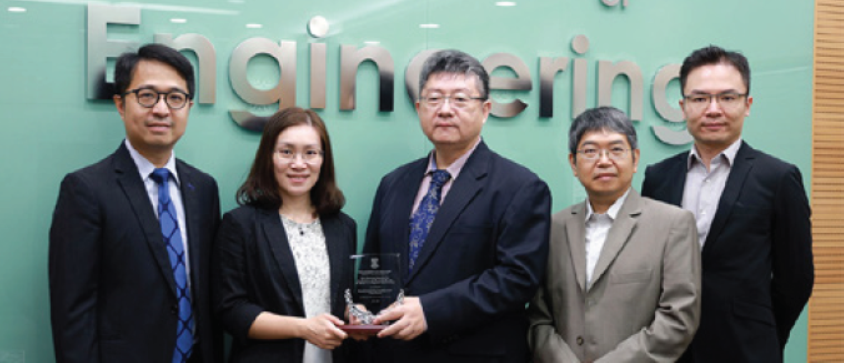
Professor Z.Q. Yue, Dr. K.L. Su, Dr. K.H. Law, Dr. C.P. Wong and Dr. A.S.H. Lau received the Faculty Outstanding Teaching Award (Team Award) 2019-2020 for their collaborative effort and achievement of Project Mingde in the past years. The award re-presentation was held on October 14, 2020 in the Faculty Conference Room.

Dr. M.M. Hu recently won the Best Paper Award (Oral) at the 2nd International Conference on Coupled Processes in Fractured Geological Media: Observation, Modeling, and Application
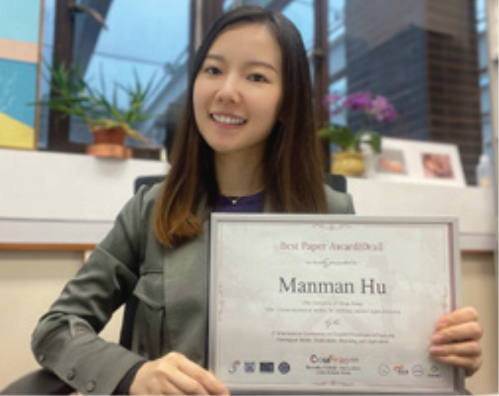
Dr. M.M. Hu recently won the Best Paper Award (Oral) for her presentation entitled “Chemo-mechanical models for acidizing assisted hydrofracturing” at the 2nd International Conference on Coupled Processes in Fractured Geological Media: Observation, Modeling, and Application (COUFRAC2020), held online and in Seoul, November 11-13, 2020. Dr. Hu’s research group has been focusing on tackling the fundamental Multi-scale Multiphysics problems of environmentally assisted cracking that is essential in a wide context of geoenvironmental circumstances concerning clean energy and adaptation to Climate Change, including enhanced geothermal systems (EGS), Carbon Capture Utilisation and Storage (CCUS), unconventional resources recovery, sediment laboratory aging, geochemical inception of land motion, effect of ocean acidification, emerging geomaterials for sustainability and resilience, etc.

Three-Minute Thesis Competition 2020

The Three Minute Thesis (3MT®) Competition challenges research postgraduate (RPg) students to explain their research within three minutes to a general audience. 3MT® was developed by The University of Queensland (UQ), Australia, in 2008. Nowadays, 3MT® are held in over 170 universities across more than 18 countries worldwide.
The 3MT®Competition in HKU Civil Engineering Department was held on Friday 16 October 2020. There were eight contestants this year:
Mr. CHAN Jake Lok-yan
Analysis and Design of Semi-rigid Modular Structures
Mr. JIANG Long
Incorporate 3-D Hydrodynamic Feature into SWMM to Simulate Drainage Facilities with Complex Hydraulic Structures
Mr. LIU Yingqi
From Ancient Pagodas to Earthquake-resistant Columns
Miss PENG Lu
A Bubble in the Membrane, a Drop from the Ocean
Mr. SHEN Mingxi
Floods in a Changing Climate: Characteristic, Mechanism and Prediction
Mr. WANG Xuefan
Drilling Process Monitoring in Geotechnical Engineering
Mr. ZHANG Runze
Micromechanical study of the fabric of granular materials
Mr. ZHANG Zhiqian
Virtual Reality Integrated Tower Crane Layout Planning for High-rise Modular Integrated Construction
The three judges of the competition are Prof. J. Yang, Prof. C.Y. Tang, and Dr. X.W. Deng. It was hosted by Dr. A.S.H. Lau with assistance from Ms. Candice Fong and Ms. Bella Tseng. The contestants were judged under three criteria: communication style, comprehension, and engagement. The quality of presentations in this year’s competition is very high in general, and we have four winners this year:
Champion:
Miss PENG Lu (Prize of HKD 8,000)
1st Runner-up:
Mr. ZHANG Runze (Prize of HKD 5,000)
2nd Runner-ups:
Mr. LIU Yingqi & Mr. SHEN Mingxi (Prize of HKD 3,000 each)
The 3MT® Competition is a challenging and valuable opportunity for RPg students to enhance their presentation and communication skills, especially to a general audience. These skills are essential for your future career development. We hope more RPg students will be interested in joining next year’s 3MT® Competition.
For more information about 3MT® in HKU, please visit http://www.ke.hku.hk/hku3mt/index.php
| Mr. CHAN Jake Lok-yan | Analysis and Design of Semi-rigid Modular Structures |
| Mr. JIANG Long | Incorporate 3-D Hydrodynamic Feature into SWMM to Simulate Drainage Facilities with Complex Hydraulic Structures |
| Mr. LIU Yingqi | From Ancient Pagodas to Earthquake-resistant Columns |
| Miss PENG Lu | A Bubble in the Membrane, a Drop from the Ocean |
| Mr. SHEN Mingxi | Floods in a Changing Climate: Characteristic, Mechanism and Prediction |
| Mr. WANG Xuefan | Drilling Process Monitoring in Geotechnical Engineering |
| Mr. ZHANG Runze | Micromechanical study of the fabric of granular materials |
| Mr. ZHANG Zhiqian | Virtual Reality Integrated Tower Crane Layout Planning for High-rise Modular Integrated Construction |
| Champion: | Miss PENG Lu (Prize of HKD 8,000) |
| 1st Runner-up: | Mr. ZHANG Runze (Prize of HKD 5,000) |
| 2nd Runner-ups: | Mr. LIU Yingqi & Mr. SHEN Mingxi (Prize of HKD 3,000 each) |

HKU Method for Estimating Base Capacity of Open-ended Steel Piles Well Received
Prof. Jun Yang of our Department and Dr. Feng Yu, our PhD graduate, have presented a new method for estimating the base capacity of open-ended steel piles in sand in a paper published in the reputable geotechnics journal of ASCE. Their new method, referred to as the Hong Kong University (HKU) method, is based on the cone penetration test (CPT), and takes the mechanisms of annulus and plug resistance mobilization into consideration. This innovative HKU method is reviewed and referenced by the newly issued guidelines of the US Federal Highway Administration (FHWA) and the Minnesota Department of Transportation.

HKU Students Helped Bringing Clean Water to a School in Myanmar

Twenty HKU students went on a 3-week trip in January 2020 led by Prof C K Mak, Dr May Chui and Dr Ryan Wong to study the water supply situation in Myanmar. They were invited to join a water supply project proposed by Community Care Myanmar, an NGO based outside of Yangon City to help the impoverished communities, to design a water supply system for a new kindergarten-cum-primary school with about 80 students in the Dagon Seikkan Township in east-central part of the city of Yangon. The school is situated in a populated slum area with about 10,000 residents, most of them living in wooden huts. The area is basically not covered by any water supply network.
Upon completion of the Myanmar trip, students took part in a follow-up activity during their 10-week summer break in Hong Kong. Despite COVID-19, they held on-line meetings, collated and assessed information, developed and appraised hypothetical virtual schemes, and consolidated their findings and recommendations into a Feasibility Study on a Low-impact Water Supply System for the school. The design comprises a 140-meters deep well to extract groundwater from the deep aquifer as a new source of water. The students established the yield from the well, prepared storage and plumbing schemes and recommended water quality tests to ensure the groundwater is suitable for consumption.

Detecting COVID-19 in Sewage
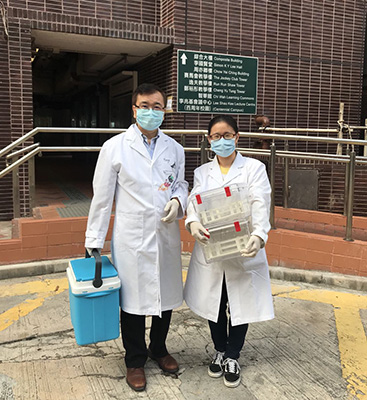
Starting from April 1, 2020, a cross-disciplinary team led by Professor Tong Zhang of the Department of Civil Engineering, got continuous support and funding from the Faculty of Engineering, Drainage Services Department, Environmental Protection Department, and Food and Health Bureau, to develop a methodology for the detection and monitoring of SARS-CoV-2 in sewage, as a supplementary measure to the overall community surveillance system. The data of SARS-CoV-2 in sewage can be used to estimate the presence and spread of the virus in the communities, complementing current clinical and laboratory surveillance efforts.
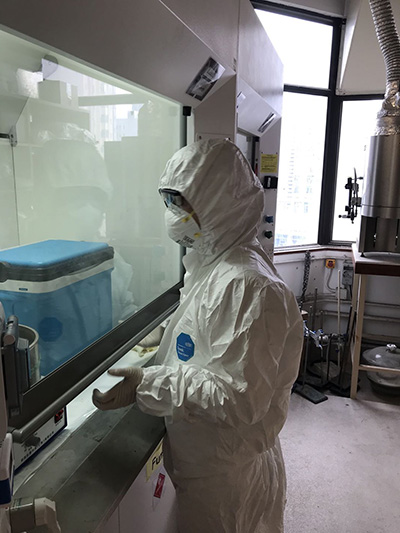 Other team members include Professor Leo Lit Man Poon, Professor Malik Peiris, Professor Gabriel Leung, and Dr. Hein Min Tun of the School of Public Health, Faculty of Medicine of HKU. Professors Poon and Professor Peiris lead the WHO Reference Laboratory for COVID-19 diagnostics at HKU. Professor Gabriel Leung is the Dean of Li Ka Shing Faculty of Medicine at the University of Hong Kong, and an expert on infectious disease epidemiology.
Other team members include Professor Leo Lit Man Poon, Professor Malik Peiris, Professor Gabriel Leung, and Dr. Hein Min Tun of the School of Public Health, Faculty of Medicine of HKU. Professors Poon and Professor Peiris lead the WHO Reference Laboratory for COVID-19 diagnostics at HKU. Professor Gabriel Leung is the Dean of Li Ka Shing Faculty of Medicine at the University of Hong Kong, and an expert on infectious disease epidemiology.
